In California, elder abuse isn’t limited to nursing homes. To be sure, residential care facilities for the elderly (RCFEs), which are also known as assisted-living facilities, retirement homes, and board and care homes, have been cited for numerous instances of elder abuse and neglect. And given that RCFEs only provide incidental medical services, these facilities aren’t subject to the same regulations as nursing homes. Which ones are safest for your elderly loved one? And which facilities haven’t been implicated in recent nursing home abuse allegations? Proposed legislation seeks to help Californians with these important questions.
New Bill Aims to Provide Access to Elder Abuse Information
Many RCFEs exist throughout the state of California. According to the California Department of Social Services, they offer services ranging from personal supervision and assistance with activities of daily living to medical services that are incidental to personal care. How can consumers know which of these facilities will provide the best care to their elderly loved ones?
A recent article in California Newswire reported that a new bill seeks to require the Department of Social Services and Community Care Licensing (DSS/CCL) to “publish on its website a list of all persons who have been excluded from owning, operating, and/or working inside any licensed care facility as a result of an Administrative Law proceeding.”
In other words, if the bill passes, the public will be able to access quickly and with relative ease a list of those who have been implicated in serious situations of elder abuse and neglect. To be sure, the bill, AB 1122, “will provide convenient online access to the Excluded Persons Administrative Action List (EPAAL),” which will provide consumers, residents of assisted-living facilities, and service providers with information about persons who could be harmful at RCFEs. Allowing easy access to these names can help to ensure that RCFEs hire caregivers with “no prior history of behaviors which endangered the health or safety of an elder.”
Changing Reporting Requirements and Public Knowledge
Currently, DSS/CCL doesn’t have to contact outside law enforcement when it learns about cases of elder abuse or neglect in RCFEs. As a result, few of these cases end up being prosecuted. Rather than turn these cases over to prosecutors, allegations often end up in administrative law proceedings. Through these, DSS/CCL “can permanently or temporarily prohibit a person from working in a licensed care facility.”
While these proceedings may help to remove a dangerous employee from an assisted-living facility in one area, they don’t prevent another facility from hiring that person down the road. To be sure, “because the individual was never brought to justice through the criminal court system, the administrative sanction does not appear in a criminal background report.”
As such, Assemblymember Cheryl R. Brown emphasized that something needed to be done. She introduced AB 1122 in hopes of providing families and facilities with the information they need to avoid working with one of these “Excluded Persons” altogether. The bill has support from Consumer Advocates for RCFE Reform (CARR).
Elder abuse and neglect are serious problems that frequently result in serious and fatal injuries to California seniors. If you are concerned that your elderly loved one has been the victim of nursing home abuse, you should contact a dedicated San Diego nursing home abuse attorney as soon as possible to discuss your case.
Photo Credit: bellimarco via Compfight cc
See Related Blog Posts:
Rising Costs of Elder Care in California Prompt Additional Scrutiny
 Southern California Nursing Home Abuse Lawyer Blog
Southern California Nursing Home Abuse Lawyer Blog









